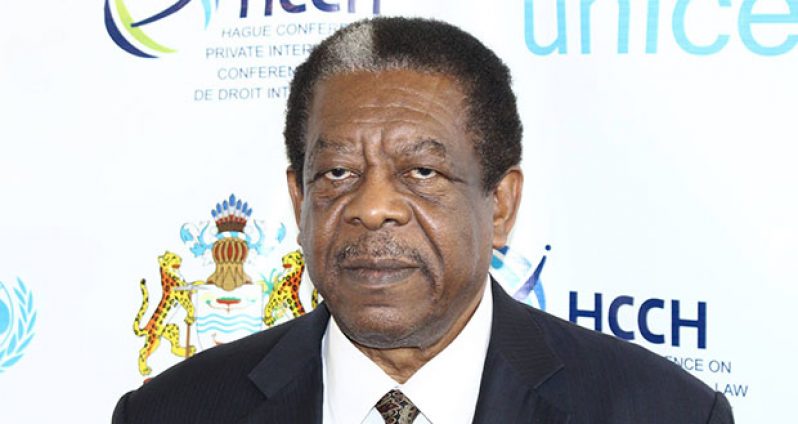By Ariana Gordon
IT HAS been 11 years since the establishment of the Caribbean Court of Justice (CCJ) and its President, Sir Dennis Byron, believes that the institution has made an impact on the Region.Sir Byron, who is currently in Guyana for The Hague Convention Conference, told reporters on Wednesday that the CCJ is fulfilling its mandate.
Structured to have two jurisdictions, an original and an appellate, the CCJ in its original jurisdiction is an international tribunal with compulsory and exclusive jurisdiction for the interpretation and application of the Revised Treaty of Chaguaramas, the treaty which established and governs the Caribbean Community (CARICOM).
The CCJ hears and delivers judgment on disputes arising between contracting parties to the Agreement, contracting parties and the Community, and between the Community’s Nationals, contracting parties and Community institutions, or between nationals themselves.
He said there are a number of cases that have proven transformative in the Region and noted that the court in its appellate jurisdiction has heard over 180 cases and has clarified many important legal provisions that affect persons within the Region.
“Eleven years is a very short time when you think about the history of judicial development but even within such a period I think we have made a very significant contribution already,” said the President of the CCJ.
He said too that in the case of Guyana, the court has dealt with several cases that have proven to be of important development not only to Guyana but to the region. Many CARICOM countries are yet to make the CCJ their final court of appeal.
The CCJ was established after the Twelfth Inter-Sessional Meeting of the Conference in 2001 in Bridgetown, Barbados where the Heads of Government Antigua & Barbuda, Barbados, Belize, Grenada, Guyana, Jamaica, Saint Kitts & Nevis, Saint Lucia, Suriname and Trinidad & Tobago signed on.
Dominica and St Vincent & the Grenadines, signed the agreement on 15 February 2003, bringing the total number of signatories to 12.
The signing of that agreement emphasized the central role of the court in providing legal certainty to the operations of the CARICOM Single Market and Economy (CSME).
Meanwhile, in its appellate jurisdiction, the CCJ considers and determines appeals in both civil and criminal matters from courts within the jurisdiction of Member states.
“As I said, eleven years is not a long time in the history of the region and indications are that discussions are moving forward,” said Sir Byron.
Thus far, only Guyana, Dominica, Barbados and Belize have acceded to the CCJ thereby making it the final court of appeal, while two other countries, Antigua and Grenada have started the process.
The President of the CCJ reminded that the two countries (Antigua and Grenada) require a referendum before their accession to the CCJ become effective.
Sir Byron said he believed that it is important for more information about the Court and how it operates be placed in the public domain so that citizens of the Region can determine the benefits that would be derived from a regional court.
“Our mission is not really to lobby people but to provide information about what the court does and how it operates – information about the cases- the case law developed… so people have an opportunity to decide for themselves what is good for them, or not.”
The CCJ has an active Communications department, he said, while noting that information is channeled through the court’s website.
Asked whether he believed that the rulings made by the CCJ are effective in determining clear established lines, Sir Byron responded in the affirmative and referenced the case of Jamaican Shanique Myrie who claimed damages against the state of Barbados after protesting the treatment she received at the Grantley Adams Airport in March 2011.
Myrie was awarded BDS$77,240 by the CCJ, which ruled that subjecting her to a cavity search, locking her up in an unsanitary cell and then deporting her ran contrary to the rules of the revised Treaty of Chaguaramas. In the ruling, the CCJ stated that people of CARICOM must be allowed, without harassment, into any member state for six months; and that if a refusal is made, the person must be given the reason in writing, and must be notified of their right to seek legal redress.
“Myrie…set out clear cut principles,” the CCJ President stated as he explained that Jamaican Maurice Tomlinson had filed an application to the CCJ seeking special leave to begin proceedings in the Court under Article 222 of the Revised Treaty of Chaguaramas that speaks to regional integration movement within CARICOM.
Tomlinson, a homosexual, claimed that the provisions of the Immigration Acts of Belize and Trinidad and Tobago prohibit the entry of homosexuals into the respective jurisdictions.
“In the court defence, the document produced to advocate their position; both governments stated that they have accepted and acted upon the decision on the Myrie case,” Sir Byron said re-enforcing his point that the rulings of the CCJ are being enforced.
The CCJ president said he is extremely happy to visit Guyana and sees Guyana as an important country in the development of the region judicially and otherwise. “We get the most cases from Guyana…and we look forward to working continuously with Guyana,” he stated.



.jpg)









